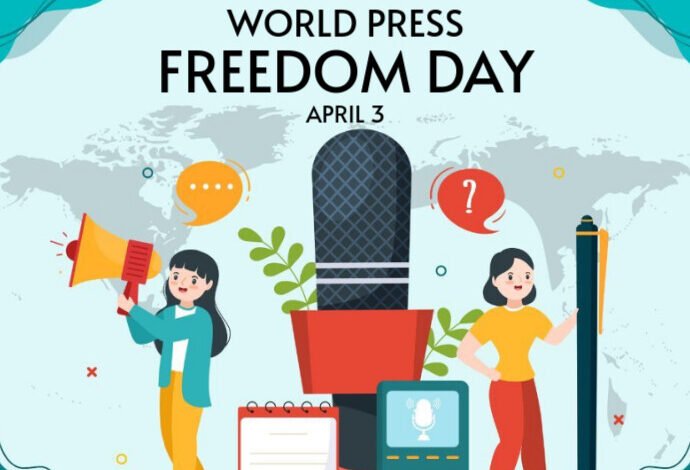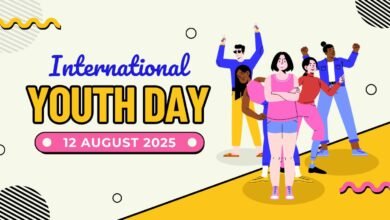World Press Freedom Day 2025: Defending Truth, Empowering Democracy

World Press Freedom Day is observed annually on May 3 to highlight the vital role that the media, the fourth pillar of democracy, plays in exposing the public to the truth. It is a day to honor the significant contributions made by journalists and to reaffirm the core values of press freedom globally, as recognized by the United Nations.
By commemorating this day, journalists and democracy advocates help protect freedom of expression, access to information, and media independence, principles that remain under constant threat. It is also a time to honor those journalists who have died or risked everything to uncover the truth.
Theme for World Press Freedom Day 2025
According to UNESCO, the theme for World Press Freedom Day 2025 is “Reporting in the Brave New World – The Impact of Artificial Intelligence on Press Freedom and the Media.”
This theme explores the impact of artificial intelligence (AI) on journalism and media operations, highlighting both its advantages, such as automation and new storytelling tools, and its risks, including algorithmic bias, disinformation, and threats to journalists’ independence and safety.
The aim is to ensure that AI advances public interest journalism while safeguarding democratic participation and freedom of expression.
AI is transforming the industry by assisting journalists with tasks like fact-checking, content creation, and reporting. It supports multilingual content production and enhances data interpretation.
However, there are also serious concerns. AI can be used to create deceptive videos, spread fake news, and potentially harm media organizations’ financial sustainability. As AI reshapes the media landscape, it is essential to weigh its benefits against its risks.
History of World Press Freedom Day
Journalists are essential in delivering factual information, promoting transparency, and holding power to account. Because of their work, they often face threats and violence. In the wake of multiple attacks on journalists during the late 20th-century African civil wars, action became urgent.
In 1991, a group of African journalists convened at a UNESCO seminar in Windhoek, Namibia, and issued the Windhoek Declaration. This document called for the establishment of an independent, pluralistic, and free press. In response, the 26th session of the UNESCO General Conference proclaimed World Press Freedom Day in 1993.
The day’s foundation lies in UNESCO’s commitment to freedom of the press and expression, which are essential for mutual understanding and lasting peace in society. It also reminds us that in many parts of the world, publications are still censored, fined, suspended, or shut down, and that media professionals continue to be harassed, attacked, and even killed for doing their jobs.
The Significance of World Press Freedom Day
World Press Freedom Day is a time to reflect, appreciate, and act. It provides a platform to recognize the importance of independent journalism and to work toward solutions for the challenges journalists face.
a. It strengthens democracy
On this day, attention is drawn to countries that suppress and censor the press. This global spotlight acts as a check on authoritarianism.
b. It values journalism as a public good
The day honors journalists who pursue ethical reporting and uphold the truth. Journalism serves the public by ensuring accountability and informed decision-making.
c. It honors those who sacrificed their lives
Many journalists have died in the line of duty. This day ensures their sacrifices are not forgotten and their legacy continues.
Why celebrating World Press Freedom Day is beneficial to children
Children are the leaders of today and tomorrow, and it is important for them to grow up in a society that upholds their freedom. Here are some of the benefits of World Press Freedom Day to children.
1. Access to accurate information
When a society has a free and independent press, it ensures children have access to truthful, reliable information about education, health, rights, and safety.
2. Media literacy
Press freedom leads to diverse and credible media sources, which helps children learn how to distinguish facts from misinformation, especially in this digital age where false content spreads easily.
3. Children become aware of their rights and global issues
It is through responsible press that children are aware of crucial issues such as climate change, bullying, and education rights. Armed with this knowledge, they are equipped to grow into informed, socially aware individuals.
4. Protection of vulnerable groups
Free media plays a vital role in exposing child abuse cases, exploitation, or neglect, thereby bringing attention to these injustices against children. This helps curb child abuse cases as relevant organisations and authorities are prompted to intervene and protect the affected children.
5. Children become better citizens of society
A society that has a free press supports democratic values. Therefore, children raised there tend to grow up and value the importance of freedom of expression, civic responsibility, and active citizenship.
How to Celebrate World Press Freedom Day
Here are a few meaningful ways to participate:
i. Organize conferences or discussions
Use the UN’s educational materials to host meetings or foster conversations with peers, students, or colleagues about press freedom and the role of journalism.
ii. Recognize false information
Support the fight against misinformation by verifying facts and sources. Honoring journalists includes valuing the integrity of the information we consume and share.
iii. Honor historical contributions
Journalists have played key roles in ending wars, toppling corrupt regimes, and leading social movements. Today is a day to remember those who used journalism to shape history and gave their lives for it.
Conclusion
World Press Freedom Day is a reminder of the role the free, independent, and ethical press serves in democracy and promoting human rights. Today, we honor journalists and their contribution to society. By raising awareness, fostering dialogue, and holding power to account, we ensure that journalism remains a force for transparency, justice, and positive change in the world.





